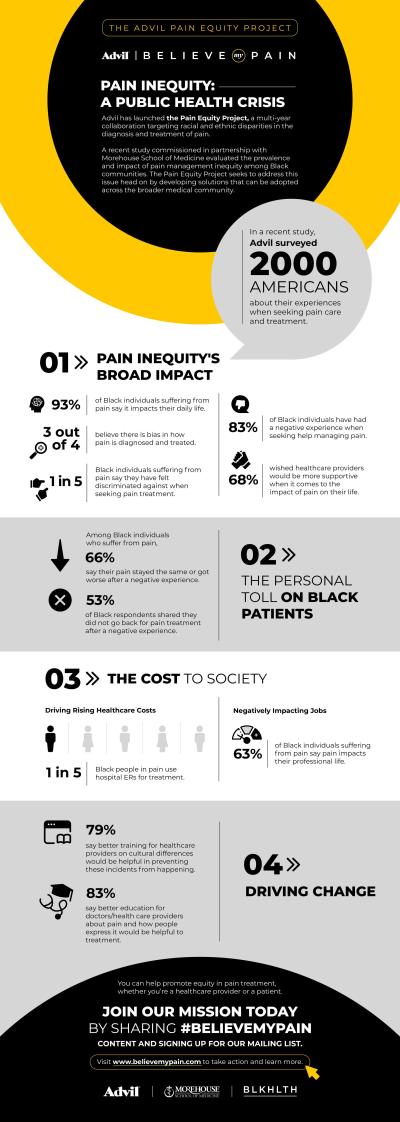Advil has launched the Advil Pain Equity Project, a multiyear commitment to help address pain inequity and racial bias in the diagnosis and treatment of pain.
Advil will be awarding grants to the Morehouse School of Medicine and BLKHLTH, a nonprofit focused on health equity, to support the development of patient resources and a course on pain equity for medical students. The grant amounts were not disclosed.
“As one of the world’s most recognizable over-the-counter pain relief brands, we believe that everyone deserves relief from pain,” Stacey Harris, vice president of marketing at Advil, said in the announcement. “To create real systematic change that gives patients true pain equity, we need to tackle this challenge at the source, which means changing how the broader medical community treats Black patients’ pain.”
The inequitable diagnosis and treatment of pain is a public health issue, disproportionately impacting communities of color. A recent survey conducted by Advil and Morehouse that reached 2,000 Americans found that 93% of Black individuals said pain impacts their daily life, and 83% said they have had a negative experience when seeking help for managing their pain.
The project also features an inaugural storytelling campaign, "Believe My Pain," which will host a roundtable discussion series with experts and members of Black communities to share their experiences with inequitable treatment related to pain. The first episode in the roundtable series is available on Advil social and digital channels, with additional content becoming available in the future.
The roundtable is led by Elaine Welteroth, a journalist and advocate, and will feature physician and health equity expert Uché Blackstock, M.D. Welteroth is an advocate in part due to her own experience with a chronic pelvic condition during her pregnancy. Finding a doctor who was not belittling or dismissive was a struggle, Flow Health previously reported.
“This negligence and lack of care in the healthcare system is unfortunately too common, and so often brings irrevocable damage to Black patients and their families,” Welteroth said in a press release. “Believe My Pain is equipping us with the knowledge, resources and power to do just that—from the patient side as well as the healthcare provider side.”

Blackstock is founder and CEO of Advancing Health Equity, an organization founded in 2019 to help healthcare organizations address bias and racism. Blackstock’s appendicitis was misdiagnosed when she was a medical student, leaving her to have to go to the ER three times to be taken seriously, she told Fierce Healthcare. By that point, her appendix had ruptured and she suffered complications as a result.
“We live in a world and a society where there is systemic racism,” Blackstock said. “I know from my own personal experiences that we need to not only bring awareness to this, but systemic change as well.”
When patients are not taken seriously in healthcare, they are more likely to distrust the system and avoid care going forward, she said. Focused training of healthcare professionals is needed to address the issue.
“If workplaces themselves are inequitable, that culture will ultimately trickle down on how care is provided to our patients,” Blackstock said.
“As an academic health center with a vision to lead the creation and advancement of health equity and justice, we must address health inequities in all the places it presents,” Tabia Henry Akintobi, Ph.D., professor and chair of community health and preventive medicine at Morehouse School of Medicine, said in the announcement. “This requires partners that share similar values. We look forward to our partnership with Advil to champion pain equity within healthcare and social systems and work towards forging a path with lasting solutions.”
The Advil Pain Equity Project will also unveil a digital series advocating for Black health featuring physician and health advocate Tosha Rogers and psychologist Ebony Butler, Ph.D., created in partnership with digital media company Urban One.
To better support patients, providers and allies, Advil and BLKHLTH developed digital tools and resources designed to improve the experience and outcomes of those seeking pain care. The resources are available on BelieveMyPain.com.